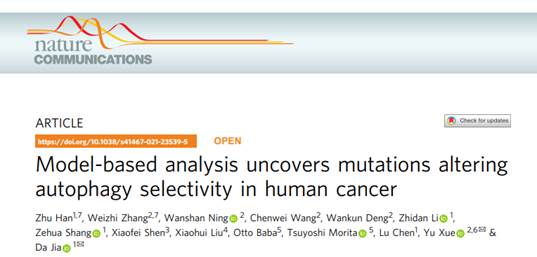On May 31st, 2021, the teams of Prof. Yu Xue from College of Life Science & Technology, Huazhong University of Science, Prof. Da Jia and Prof. Lu Cheng from West China Second University Hospital, State Key Laboratory of Biotherapy and Collaborative Innovation Center of Biotherapy, Sichuan University and Dr. Xiaohui Liu from School of Life Sciences, Tsinghua University published a research article entitled “Model-based analysis uncovers mutations altering autophagy selectivity in human cancer” in Nature Communications. The Ph.D. Zhu Han and Weizhi Zhang are co-first authors of this article. Weizhi Zhang is the Ph.D. candidate of Bioinformatics, College of Life Science & Technology, Huazhong University of Science. Prof. Lu Chen and Dr. Xiaohui Liu are the co-authors. Prof. Yu Xue and Prof. Da Jia are the corresponding authors.

Autophagy is commonly acknowledged as a crucial biological process, which can selectively target protein aggregates, pathogens, and dysfunctional organelles for the lysosomal degradation by forming a bilayer membrane vesicle named autophagosome. In 2016, Japanese scientists Yoshinori Ohsumi received the Nobel Prize in Physiology or Medicine for his contribution in discoveries of mechanisms for autophagy. There are two types of autophagy, the bulk autophagy and the selective autophagy. According to the types of targeted cytoplasmic materials, more than 20 types of selective autophagy have been identified, such as glycophagy, mitophagy and lipophagy. The selectivity of autophagy is determined by the autophagy adaptors, most of which contain the LC3-interacting region (LIR motif) to interact with LC3 proteins located on autophagosomes and transport the cargos into autophagosomes. Though it is conceivable that alteration of the degradation processes could disrupt normal cellular signaling and contribute to human diseases such as cancer, the cause and mechanism of aberrant selective autophagy participating in human cancer progress remain to be further studied.

In this study, our teams have developed a pipeline called “inference of cancer-associated LC3-interacting region-containing proteins” (iCAL), which integrated publicly available cancer mutations, a machine learning sequence-based predictor, a model-based computational method for inferring LIR motif-associated mutations, multi-omics pan-cancer analysis and experimental approaches in vitro and in vivo. Using iCAL, we have identified 222 LIR motif-associated mutations (LAMs) in 148 LIR-containing proteins (LIRCPs), and validated that LAMs in ATG4B, STBD1, EHMT2 and BRAF impaired/enhanced their interactions with LC3 and autophagy activities. In pan-cancer analysis, the glycophagy adaptor STBD1 showed potential tumor suppressive activity. Meanwhile we performed immunohistochemistry (IHC) staining in colon cancer specimens and found that the expression of STBD1 at the protein level was significantly lower in the cancer tissues. Further study verified that mutation in STBD1 (W203C) disrupted the LIR motif to decrease the co-localization among STBD1, LC3B/ GABARAPL1 and glycogen, which suppressed the glycogen metabolism and glycophagy. Using multiple cell lines and mouse tumor xenograft model, we found that overexpression of STBD1 inhibited the growth of cancer cells, whereas silencing of STBD1 or STBD1 W203C was pro-tumorigenic. Using RNA sequencing (RNA-seq) technology, we found that shSTBD1 or STBD1 W203C could lead to metabolic reprogramming. Combined with the result of metabolomic profiling and isotope tracing analysis, it was found that STBD1 suppression enhanced glycolysis, boosted the TCA cycle, and promoted nucleotide biosynthesis through the pentose phosphate pathway, which could further promote tumorigenesis. Finally, according to 148 identified LIRCPs, we modeled a LIRCP-regulating network to infer that mutation could affect 9 classes of autophagy pathways perturbed in human cancer. Overall, iCAL is a useful resource to investigate the link between aberrant autophagy and human cancer. Using iCAL, we systematically identified mutations that altered LIR motif and verified the mechanism of cancer mutation effecting autophagy selectivity. And we firstly clarified the molecular mechanism of glycophagy participating in cancer regulation, by identifying mutation W203C could change STBD1 LIR motif and suppress both glycogen metabolism and glycophagy, which promoted tumorigenesis. We hope that iCAL can help the community to discover and verify novel autophagy pathways for cancer development, and lead, ultimately, to new cancer therapeutic approaches via manipulating these pathways.
This research is supported by Special Project on Precision Medicine under the National Key R&D Program, Natural Science Foundation of China, Fundamental Research Funds for the Central Universities, Changjiang Scholars Program of China, the program for HUST Academic Frontier Youth Team and Sichuan Science and Technology Program.
https://www.nature.com/articles/s41467-021-23539-5